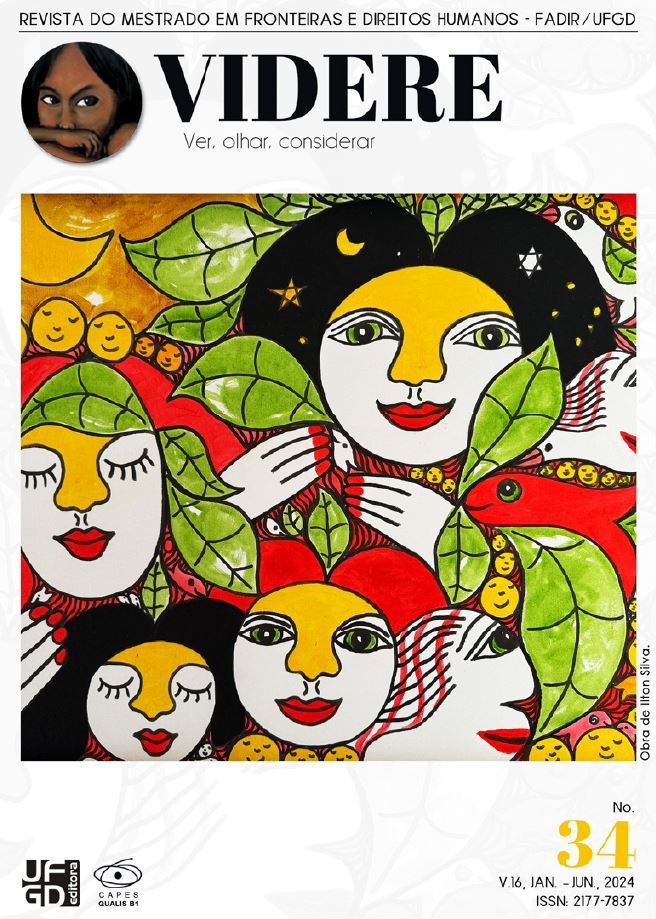Development as freedom: possible dialogues between Sen's work and the goals of sustainable development
DOI:
https://doi.org/10.30612/videre.v16i34.17430Keywords:
Development as Freedom, sustainable development, 2030 AgendaAbstract
This article intends to bring together Amartya Sem’s work “Development as Freedom” and the ideal contained in the 2030 Agenda for Sustainable Development, through a review of the literature related to the theme, through a comparison between each thematic axis of the objectives for sustainable development and the work of the aforementioned author and his criteria for achieving human emancipation and, consequently, the human right to development, through the implementation of the 2030 Agenda.
Downloads
References
ARAUJO, João Pedro Garcia; MORAES, Gustavo Inácio de. Utilitarismo e desenvolvimento sustentável: eles podem se encontrar? Revista de Economia Mackenzie, São Paulo, v. 11, n. 3, p. 187-208, jul. 2016. Disponível em: http://repositorio.pucrs.br/dspace/handle/10923/14358. Acesso em: 10 set. 2019.
BARBIERI, Fábio. O processo de mercado na escola austríaca moderna. 2001. Dissertação (Mestrado em Teoria Econômica) – Faculdade de Economia, Administração e Contabilidade, Universidade de São Paulo, São Paulo, 2001. doi:10.11606/D.12.2001.tde-20102001-144955. Acesso em: 20 set. 2020.
BRASIL. Supremo Tribunal Federal. STF. Ação Direta de Inconstitucionalidade por Omissão n. 26/DF. Relator: Ministro Celso de Mello. Brasília, DF, 13 de junho de 2019. Diário de Justiça Eletrônico. Brasília, 1 jul. 2019.
FREITAS, Tanise Dias et al. Sen e o desenvolvimento como liberdade. In: NIEDERLE, Paulo André; RADOMSKY, Guilherme Francisco W. (org.). Introdução às teorias do desenvolvimento. Porto Alegre: UFRGS Editora, 2016. p. 63-80.
FREITAS, Franchesco Maraschin de; ZAMBAM, Neuro José. O utilitarismo e o princípio responsabilidade para o desenvolvimento sustentável. Revista Direito Ambiental e Sociedade, Caxias do Sul, v. 5, n. 2, 2015, p. 28-53. Disponível em: http://www.ucs.br/etc/revistas/index.php/direitoambiental/article/view/3777. Acesso em: 25 ago. 2020.
MÁXIMO, Mário. Desenvolvimento sem liberdade: uma análise crítica do pensamento de Amartya Sen. Cadernos de Desenvolvimento, Rio de Janeiro, v. 8, n. 13, p. 57-67, dez. 2013. Disponível em: http://www.cadernosdodesenvolvimento.org.br/ojs-2.4.8/index.php/cdes/article/view/137/138. Acesso em: 8 ago. 2020.
OLIVEIRA, Gilson Batista. Uma discussão sobre o conceito de desenvolvimento. Revista FAE, Curitiba, v. 5, n. 2, p. 37-48, ago. 2002. Disponível em: https://revistafae.fae.edu/revistafae/article/view/477. Acesso em: 31 ago. 2020.
ORGANIZAÇÃO DAS NAÇÕES UNIDAS – ONU. Objetivos de Desenvolvimento Sustentável – ODS, 2015. Disponível em: https://nacoesunidas.org/pos2015/agenda2030/. Acesso em: 31 jul. 2019.
PEREIRA, Laura. The role of substantive equality in finding sustainable development pathways in South Africa. McGill International Journal of Sustainable Development Law and Policy, Montreal, v. 10, n. 2, p. 147-178, 2014. Disponível em: https://www. researchgate.net/publication/273316179_The_role_of_substantive_equality_in_finding_sustainable_development_pathways_in_South_Africa. Acesso em: 27 ago. 2020.
PEREIRA, Paulo Trigo. A teoria da escolha pública (public choice): uma abordagem neoliberal? Análise Social, Lisboa, Quarta Série, v. 32, n. 141, p. 419-442, 1997. Disponível em: http://analisesocial.ics.ul.pt/documentos/ 1221841484T5sAW2pw7Dh10FX8.pdf. Acesso em: 30 ago. 2020.
SCOTT, Joan. O enigma da igualdade. Estudos Feministas, Florianópolis, n. 13, v. 1, p. 11-30, jan./abr. 2005. Disponível em: https://www.scielo.br/pdf/ref/v13n1/a02v13n1.pdf. Acesso em: 19 ago. 2020.
SEN, Amartya. Desenvolvimento como liberdade. 7. ed. São Paulo: Companhia das Letras, 2019.
SEN, Amartya. More than 100 million women are missing. The New York Review of Books, 20 dez. 1990. Disponível em: https://www.nybooks.com/articles/1990/12/20/more-than-100-million-women-are-missing/. Acesso em: 15 ago. 2020.
SOUZA, José Fernando Vidal de; VIENNA, Stephanie Dettmer di Martin. O direito ao desenvolvimento diante do pensamento sistêmico: uma abordagem sobre desenvolvimento como liberdade, sobre desenvolvimento sustentável e sustentabilidade na atualidade. Revista de Direito Brasileira, v. 21, n. 8, p. 341-360, set./dez. 2018, São Paulo. Disponível em: https://www.indexlaw.org/index.php/rdb/article/view/3904. Acesso em: 20 set. 2019.
SUPIOT, Alain. O espírito de Filadélfia: a justiça social diante do mercado total. Porto Alegre: Sulina, 2014.
WEDY, Gabriel de Jesus Tedesco. Desenvolvimento (sustentável) e a ideia de justiça segundo Amartya Sen. Revista de Direito Econômico e Socioambiental, Curitiba, v. 8, n. 3, p. 343, 16 fev. 2018. Disponível em: https://periodicos.pucpr.br/index.php/direitoeconomico/article/download/23527/22602. Acesso em: 10 ago. 2020.
Downloads
Published
How to Cite
Issue
Section
License

This work is licensed under a Creative Commons Attribution-NonCommercial-ShareAlike 3.0 Unported License.
Authors must accept the publication rules when submitting the journal, as well as agree to the following terms:
(a) The Editorial Board reserves the right to make changes to the Portuguese language in the originals to maintain the cultured standard of the language, while respecting the style of the authors.
(b) Authors retain the copyright and grant the journal the right to first publication, with the work simultaneously licensed under the Attribution-NonCommercial-ShareAlike 3.0 Brazil (CC BY-NC-SA 3.0 BR) that allows: Share - copy and redistribute the material in any medium or format and Adapt - remix, transform, and create from the material. CC BY-NC-SA 3.0 BR considers the following terms:
- Attribution - You must give the appropriate credit, provide a link to the license and indicate whether changes have been made. You must do so under any reasonable circumstances, but in no way that would suggest that the licensor supports you or your use.
- NonCommercial - You may not use the material for commercial purposes.
- Sharing - If you remix, transform, or create from material, you must distribute your contributions under the same license as the original.
- No additional restrictions - You may not apply legal terms or technological measures that legally restrict others from doing anything that the license permits.
(c) After publication, authors are allowed and encouraged to publish and distribute their work online - in institutional repositories, personal page, social network or other scientific dissemination sites, as long as the publication is not for commercial purposes.



















